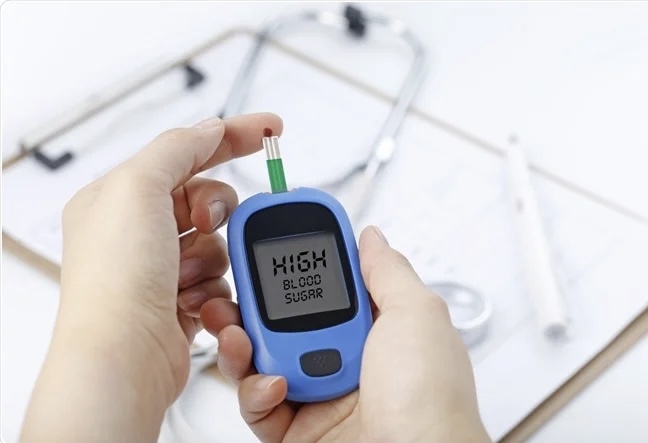12 Indicators That Your Blood Sugar Levels Are Elevated
Monitoring blood sugar is important for everyone, not just those diagnosed with diabetes. Imbalanced blood sugar can lead to a variety of health issues, many of which can go unnoticed until they become more severe. In this article, we will explore 12 signs of high blood sugar, the potential risks of unchecked levels, and practical tips for managing your glucose.
What is Blood Sugar?
Blood sugar, or glucose, is the body’s main source of energy. It fuels your cells and helps keep your body functioning. Insulin, a hormone produced by the pancreas, plays a crucial role in regulating blood sugar. It helps transport glucose from the bloodstream into your cells where it can be used for energy. If this process is disrupted, such as when the cells become resistant to insulin, high blood sugar, also known as hyperglycemia, can result.
Signs of High Blood Sugar
-
Constant Thirst
High blood sugar causes the kidneys to work overtime to filter and absorb excess glucose, leading to dehydration. This can make you feel thirsty all the time, as your body tries to replenish lost fluids. -
Frequent Urination
Excess glucose in the bloodstream can pull water from your organs, causing the body to excrete more urine. This might lead to having to urinate up to 20 times a day, even when your body doesn’t need the water. Staying hydrated can help maintain balanced blood sugar levels. -
Increased Hunger
Even with high blood sugar, your body may struggle to use glucose efficiently. This signals the brain that more food is needed, resulting in feelings of hunger even after eating. -
Fatigue and Weakness
When the kidneys are overwhelmed with excess sugar, fatigue can set in. You might feel tired or sluggish because the body’s energy production is disrupted, and hormones responsible for alertness may be out of balance. -
Blurred Vision
Swelling in the lenses of the eyes due to high blood sugar can lead to blurry vision. This is a sign that it’s time to check your glucose levels. -
Slow Healing of Wounds
High blood sugar can weaken the immune system, making it harder for your body to fight infections and heal injuries. Wounds may take longer to close or become infected. -
Frequent Infections
An elevated blood sugar level can make your body more susceptible to infections, such as urinary tract infections, skin infections, or gum disease. Increased glucose can affect the body’s ability to defend itself against harmful bacteria. -
Numbness or Tingling
High blood sugar levels can cause nerve damage, a condition called diabetic neuropathy. This often manifests as numbness or tingling in the hands or feet, and may worsen over time. -
Irritability and Mood Swings
Blood sugar imbalances can cause fluctuations in hormones, leading to mood changes. If you notice yourself becoming more irritable or emotional, it could be a sign of high glucose levels affecting your mental state. -
Dry Mouth and Skin
As dehydration sets in, you might experience dry mouth or dry skin. Drinking enough water throughout the day can help reduce these symptoms and prevent further complications. -
Bad Breath
High blood sugar levels can lead to the buildup of ketones, a byproduct of fat breakdown, which can cause a distinct, fruity odor in your breath. This smell may resemble nail polish remover and could indicate that your blood sugar is out of balance. -
Swollen Legs or Feet
Excess sugar in the bloodstream can cause fluid retention in your legs and feet, making them swell. This can be a sign of poor circulation and should be monitored, especially if swelling becomes persistent.
Risks of Uncontrolled High Blood Sugar
Left untreated, high blood sugar can lead to serious health problems. Over time, hyperglycemia can damage blood vessels, nerves, and organs. Chronic high blood sugar increases the risk of developing type 2 diabetes, heart disease, kidney damage, and vision problems. Early detection and proper management are essential in reducing these risks.
How to Manage Blood Sugar Levels
-
Healthy Eating
Adopt a balanced diet that includes lean proteins, whole grains, and plenty of vegetables. Avoid sugary snacks and beverages, and opt for complex carbohydrates that provide longer-lasting energy and help stabilize blood sugar levels. -
Regular Exercise
Exercise helps your body use insulin more efficiently, which helps keep blood sugar levels in check. Aim for at least 30 minutes of moderate physical activity most days of the week, whether it’s walking, cycling, or swimming. -
Stay Hydrated
Drinking water helps flush excess sugar from the body and supports healthy kidney function. Make sure to drink plenty of fluids throughout the day to maintain normal blood glucose levels. -
Monitor Your Blood Sugar
Regularly testing your blood sugar levels will help you understand how different foods and activities impact your glucose. Using a glucometer can help you stay on top of your blood sugar and track any changes over time.
By recognizing the signs of high blood sugar early and taking steps to manage it, you can reduce the risk of developing serious complications. Maintaining a healthy lifestyle and monitoring your glucose levels regularly will help keep your body functioning at its best.
